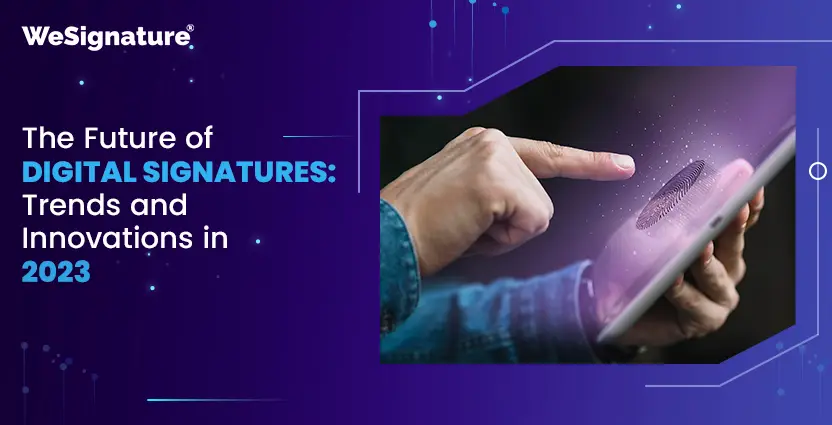The Future of Digital Signatures: Trends and Innovations in 2023

Future of Digital Signatures: In today’s fast-paced digital product engineering services, the way we conduct business and handle transactions has undergone a significant transformation.
One of the key changes in this regard is the widespread adoption of digital signatures. As we step into 2023, digital signatures are composed to reach new heights, driven by emerging trends and innovations that promise to make them even more secure, efficient, and user-friendly.
In this blog, we will explore the exciting developments in the world of digital signatures and what the future holds for this technology.
The Current State of Digital Signatures
Before we delve into the future, let’s take a quick look at the present landscape of digital signatures. Digital signatures have already become an integral part of business operations, particularly in industries like finance, legal, and healthcare.
They offer a secure and convenient way to sign documents electronically, eliminating the need for physical paperwork and in-person signatures.
Digital signature platforms like WeSignature (https://wesignature.com/) have played a significant role in simplifying the signing process, providing users with user-friendly interfaces and robust security measures. However, the digital signature ecosystem is constantly evolving, and 2023 promises to be a year of significant advancements.
Trends Shaping the Future of Digital Signatures
1. Increased Integration with Blockchain
Blockchain technology has gained immense popularity for its security and transparency features. In 2023, we can expect to see greater integration between digital signatures and blockchain technology.
This integration will add an additional layer of trust and immutability to digital signatures, making them even more tamper-proof and reliable.
When a document is signed using blockchain-based digital signatures, a cryptographic hash of the document is stored on the blockchain, ensuring that the signed document cannot be altered or forged without detection.
This level of security will be particularly valuable in industries where document integrity is of utmost importance, such as legal and healthcare.
2. Advanced Biometric Authentication
While password-based authentication has long been a standard for digital signatures, the future will witness a shift towards more robust biometric authentication methods. Technologies like facial recognition, fingerprint scanning, and even voice recognition will become commonplace for verifying the identity of signatories.
Biometric authentication not only enhances security but also simplifies the signing process for users. With a quick glance or a touch, signatories can validate their identity, making digital signatures more accessible and user-friendly.
3. AI-Powered Document Analysis
Artificial intelligence (AI) is making significant strides in document analysis and understanding. In 2023, we can expect to see digital signature platforms leveraging AI integration services to provide advanced document analysis capabilities.
This means that the software will be able to understand the content of the document and provide context-aware signing suggestions.
For example, if you’re signing a complex legal contract, the AI-powered system could highlight critical clauses or terms that require your attention. This not only streamlines the signing process but also ensures that signatories are fully aware of what they are signing.
4. Mobile-First Solutions
The world is increasingly mobile, and digital signature solutions must keep up with this trend. Mobile-first solutions will gain prominence in 2023, allowing users to sign documents from their smartphones and tablets with ease.
These solutions will be optimized for touch interfaces, making the signing process intuitive and efficient.
Moreover, mobile-first digital signature platforms will offer features like mobile document scanning and on-the-go signing, further enhancing their convenience and accessibility.
5. Enhanced Security Measures
As cyber threats continue to evolve, digital signature platforms will need to stay ahead of the curve when it comes to security. In 2023, we can anticipate the implementation of even more robust security measures, including multi-factor authentication, end-to-end encryption, and real-time threat detection.
These security enhancements will not only protect the integrity of digital signatures but also instill confidence in users that their documents are safe from unauthorized access or tampering.
Innovations in Digital Signature Technology
Alongside these trends, there are specific innovations in digital signature technology that promise to revolutionize the way we sign documents.
1. Smart Contracts
Smart contracts are self-executing contracts with the terms of the agreement directly written into code. In 2023, digital signatures will increasingly be used to execute smart contracts automatically.
This will enable businesses to automate complex processes, such as payment releases or supply chain agreements, without the need for intermediaries.
2. Quantum-Safe Signatures
As quantum computing advances, it poses a potential threat to traditional cryptographic methods. In response, quantum-safe signatures are emerging as a solution.
These signatures use algorithms resistant to quantum attacks, ensuring the long-term security of digital signatures in a post-quantum computing era.
3. Decentralized Identity
Decentralized identity solutions are gaining traction, allowing individuals to have control over their digital identities. Digital signatures will enable users to sign and verify identity independently of central authorities, crucial for decentralized systems.
READ MORE | Electronic Signature vs Digital Signature – WeSignature
Conclusion
In 2023, digital signatures evolve with blockchain, biometrics, AI, mobile solutions, and enhanced security, transforming document signing.
Innovations like smart contracts and decentralized identity will expand digital signatures’ capabilities, offering new possibilities for businesses and individuals.
As digital signatures continue to evolve, platforms like WeSignature will play a crucial role in providing cutting-edge solutions that empower users to sign documents securely and efficiently in the digital age.
Get ready for a future where digital signatures replace pen-and-paper, becoming central in our connected world.

